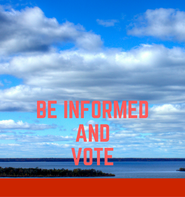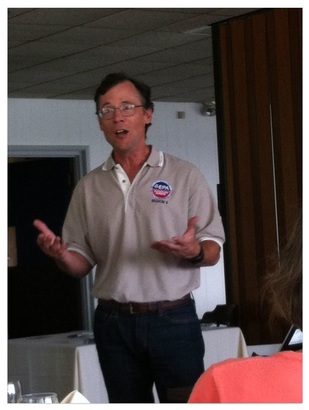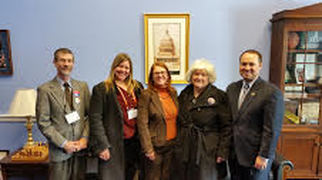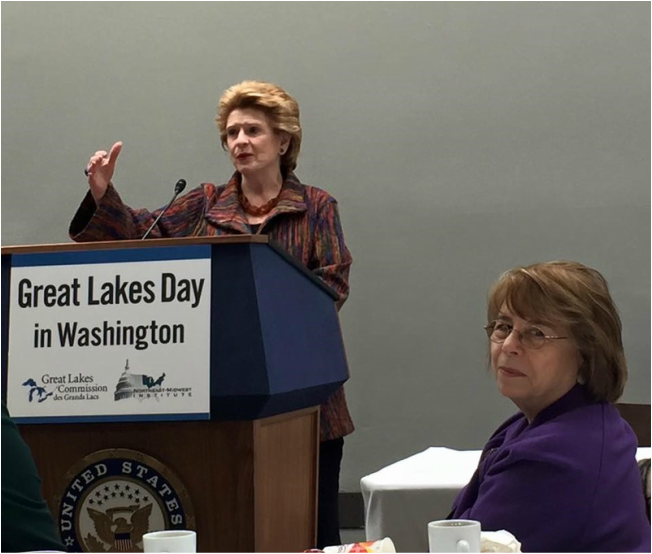Clinton and Trump Campaigns Pledge Ongoing Support for the Great Lakes Restoration Initiative9/28/2016
 The Healing Our Waters--Great Lakes Coalition invited both major party Presidential candidates to speak at its annual restoration conference held last week in Sandusky, OH. Representatives from both campaigns attended, gave statements and answered several questions moderated by Todd Ambs, coalition campaign director. Great news: both pledged to continue support for the Great Lakes Restoration Initiative (GLRI), if elected! LWVLMR encourages all voters to be informed about where the candidates stand on Great Lakes issues. Healing Our Waters has posted videos from the forum on Facebook. Watch and determine which best represents your views on the importance of and emphasis on the lakes: Trump campaign representative, Mike Budzik, past chief, Ohio Division of Wildlife under Ohio Gov. Bob Taft, and Clinton campaign representative David Hayes, former deputy secretary, Department of Interior in the Obama Administration. LWVLMR has advocated for federal funding of the GLRI with the Coalition since the start of the program. The GLRI has brought $2.2 billion of restoration projects to the Great Lakes over the last seven years, but much work is still needed to improve the health of the lakes. Congratulations to the Healing Our Waters Coalition for organizing a terrific Great Lakes Days event in Washington DC. Leaguers played an important part of this group of over 100 Lake lovers who convened in February to get updates on the successes of the Great Lakes Restoration Initiative, hear speakers, and participate in in-person meetings with elected representatives and staff on Capitol Hill. One of our most effective handouts for making our case is a description of restoration successes from around the Great Lakes region, which can be accessed here .
The Great Lakes Restoration Initiative (GLRI) is an inter-agency program designed to address the most significant problems in the Great Lakes and works to protect, restore and maintain the Great Lakes Ecosystem. It has traditionally enjoyed bi-partisan support. At our Congressional breakfast both Republicans and Democrats from both Houses addressed the group in support of our work. Unfortunately, President Obama’s current budget requests only $250 million for FY 2017. We were lobbying to have that amount restored to $300 million to maintain the current level of funding because, although GLRI is showing real and measurable results, there is still plenty of work to be done. LWVLMR supports authorization and multi-year funding of $300 million per year for the GLRI and encourages you to contact your federal legislators in support of this position. The visit was timely as there is heightened concern about drinking water across the states, due to the crisis in Flint, MI. So in addition to the request for GLRI support, we were also asking for a boost to the Clean Water and Drinking Water State Revolving Fund programs that help local communities upgrade aging water infrastructure to protect drinking water, reduce sewer overflows, and prevent beach contamination. Additionally, protection against Asian carp and other invasive species coming through the Chicago Area Waterways was sought, with emphasis on speeding up the Brandon Road Feasibility study by the Army Corps of Engineers. Brandon Road is the site of a Lock and Dam on the Illinois River and was identified as a possible choke point to stop the fish in a previous study which we lobbied for. All of our Great Lakes LWV states except Pennsylvania are members of the Healing Our Waters Coalition. Their annual conference will be September 20-22, 2016 in Sandusky, OH this year and we encourage League members to attend.  Tim Drexler of the US EPA Tim Drexler of the US EPA On July 7, the Waukegan Harbor Citizens Advisory Group hosted the Lake Michigan League of Women Voters for an informative and interesting lunch at the Waukegan Yacht Club followed by a cruise in the harbor aboard the educational research vessel, W.G. Jackson. USEPA Superfund Project Manager Ted Drexler addressed our group over lunch, and Waukegan Harbor Citizen Action Group President Susie Schreiber assisted the boat crew in identifying important aspects of the cruise. We were eager to see the results of millions of dollars of spending in public money to clean up industrial waste, and also to enjoy the beautiful but windy day on the lake. In this we were not disappointed as about 35 attendees from Winthrop Harbor to Evanston asked questions and made investigations with the help of the crew. We had three elected officials in our midst, as well as some students. In 1981, prompted by the discovery of high levels of polychlorinated biphenyls (PCBs) in harbor sediments, Waukegan Harbor was named as one of 43 Areas of Concern (AOC) on the Great Lakes by the International Joint Commission, U.S. EPA and IllinoisEPA. The harbor was identified as an AOC using protocols developed by the United States and Canada under the Great Lakes Water Quality Agreement of 1987. The Waukegan Harbor Citizens Advisory Group (CAG) was formed by the Illinois EPA in 1990 to assume a leadership role in developing a remedial action plan (RAP) for the Waukegan Harbor AOC. The harbor at one time had the largest known concentrations of PCBs and PCB-contaminated sediments, left from previous industrial uses of the site, including the Outboard Marine Corporation. In addition to lessening contamination in the harbor, the CAG also worked with state and local government officials to deal with the open dumping of litter, garbage and tires, and has worked to identify older commercial properties that are candidates for redevelopment. The CAG has received a Great Lakes Restoration Initiative (GLRI) Grant to restore portions of the Glen Flora Ravine and the coastal habitat located south of Illinois Beach State Park to the City of Waukegan public beach. The League of Women Voters Lake Michigan Region has lobbied hard for the continued funding of the GLRI since it was first introduced in 2010. We believe that investment in the Great Lakes should be a national priority, as they hold 84% of America’s surface fresh water, with only 1% being “new” water each year as what we have is left from the Glaciers passage 10,000-14,000 years ago. For Further information: http://epa.gov/greatlakes/aoc/waukegan/index.html http://www.epa.gov/region5/cleanup/outboardmarine/index.htm  Bruce Allen & Abigail King from Save Maumee, Debbie Chubb & Jeanette Neagu, LWV of Indiana, and Rep. Marlin Stutzman (IN-3). Feb. 26, 2015 Bruce Allen & Abigail King from Save Maumee, Debbie Chubb & Jeanette Neagu, LWV of Indiana, and Rep. Marlin Stutzman (IN-3). Feb. 26, 2015 I have just returned from Washington, D.C. where Debbie Chub and I represented League of Women Voters of Indiana at Great Lakes Day. This is an annual event where citizen lobbyists from throughout the country come to address the need for continuation of federally funded programs to protect the Great Lakes from pollution and to restore the Areas of Concern, and discuss other important concerns about the health of the Great Lakes. LWVIN is a member of Healing our Waters, the Coalition that organizes Great Lakes Day. The Indiana team was able to meet with Representatives Stutzman and Walorski as well as staff from the offices of Representatives Carson, Visclosky, Donnelly and Coats. The other Indiana Representatives did not respond to meeting requests. The first day we were updated on all the marvelous projects that have been completed because of Great Lakes Restoration Funding. Please take a look at the Great Lakes, Great Impact website from the Joyce Foundation which gives you more information about the Great Lakes Restoration Initiative (GLRI). We would appreciate any efforts you can make to gain your legislator’s support for $300 million federal dollars to continue the work of restoring the Great Lakes. Healing Our Waters has put out an action alert with valuable information about how individuals can help. Debbie and I were also able to attend a most informative hearing called by Representative John Conyers (MI-3) and the Unitarian Universalist Service Committee on how federal, state and local agencies can work together to ensure universal access to quality drinking water. The hearing was supported by Representatives Charlie Rangel (NY-13), Earl Blumenauer (OR-3), Brenda Lawrence (MI-14), Debbie Dingell (MI-12), and Sheila Jackson Lee (TX-18). This link describes the problem addressed: http://www.huffingtonpost.com/john-conyers/drinking-water-a-human-ri_b_6754308.html Representative Stutzman is a farmer and was most amenable to our suggestions on the necessity of reducing nutrient outflows from farm lands into our waterways. We expected to spend fifteen minutes with a staff member and instead spent forty minutes with him. The trip was very valuable. Jeanette Neagu, Chair Natural Resources Committee LWV of Indiana |
Archives
December 2017
Categories
All
|


 RSS Feed
RSS Feed